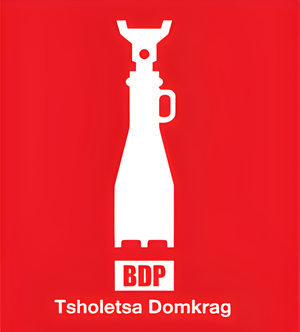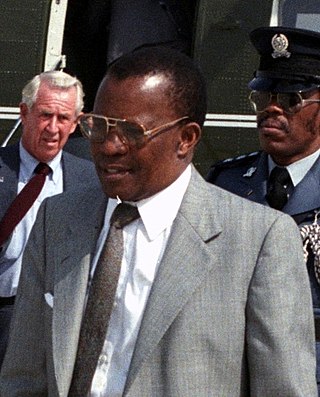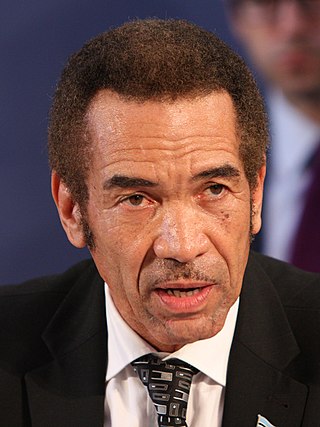Related Research Articles
The history of Botswana encompasses the region's ancient and tribal history, its colonisation as the Bechuanaland Protectorate, and the present-day Republic of Botswana. The first modern humans to inhabit Botswana were the San people, and agriculture first developed approximately 2,300 years ago. The first Bantu peoples arrived c. 200 CE, and the first Tswana people arrived about 200 years later. The Tswana people split into various tribes over the following thousand years as migrations within the region continued, culminating in the Difaqane in the late 18th century. European contact first occurred in 1816, which led to the Christianization of the region.

Botswana is a parliamentary republic in which the President of Botswana is both head of state and head of government. The nation's politics are based heavily on British parliamentary politics and on traditional Batswana chiefdom. The legislature is made up of the unicameral National Assembly and the advisory body of tribal chiefs, the Ntlo ya Dikgosi. The National Assembly chooses the president, but once in office the president has significant authority over the legislature with only limited separation of powers. The Botswana Democratic Party (BDP) rules as a dominant party; while elections are considered free and fair by observers, the BDP has controlled the National Assembly since independence. Political opposition often exists between factions in the BDP rather than through separate parties, though several opposition parties exist and regularly hold a small number of seats in the National Assembly.

The president of the Republic of Botswana is the head of state and the head of government of Botswana, as well as the commander-in-chief of the armed forces, according to the Constitution of Botswana. Sir Seretse Khama was the prime minister from 1965 to 1966, however he later became president of Botswana, and as of 2024 there have been no prime ministers since.

Festus Gontebanye Mogae is a Botswana politician and economist who served as the third President of Botswana from 1998 to 2008. He succeeded Quett Masire as President in 1998 and was re-elected in October 2004; after ten years in office. He stepped down in 2008 and was succeeded by Lieutenant General Seretse Khama Ian Khama.

The Botswana Democratic Party is the governing party in Botswana. Its chairman is the Vice-President of Botswana, Slumber Tsogwane, and its symbol is a lift jack. The party has ruled Botswana continuously since gaining independence from the United Kingdom in 1966. The BDP is sometimes classified as a paternalistic conservative party and is also a consultative member of the Socialist International since 2014, which is a group including many worldwide social-democratic parties.

Ketumile Quett Joni Masire, GCMG, was the second and longest-serving president of Botswana, in office from 1980 to 1998. He was given an honorary knighthood of the Grand Cross of Saint Michael and Saint George by Queen Elizabeth II (GCMG) in 1991.
Moutlakgola Palgrave Kediretswe Nwako was a former politician and diplomat in Botswana. Nwako served as the first foreign minister from 1966-1969. He was Speaker of the National Assembly of Botswana from 1989 to 1999.

Botswana–South Africa relations refers to the historical and current relationship of Botswana and South Africa. Botswana has a high commission in Pretoria, and South Africa has a high commission in Gaborone. Both countries are former British colonies and members of the African Union, the Commonwealth of Nations, and the Southern African Development Community (SADC).

Seretse Khama Ian Khama is a Botswana politician and former military officer who was the fourth President of the Republic of Botswana from 1 April 2008 to 1 April 2018. After serving as Commander of the Botswana Defence Force, he entered politics and was Vice-President of Botswana from 1998 to 2008, then succeeded Festus Mogae as President on 1 April 2008. He won a full term in the 2009 election and was re-elected in October 2014.

Ponatshego Honorius Kefaeng Kedikilwe is a Motswana politician who was Vice-President of Botswana from 2012 to 2014. A member of the ruling Botswana Democratic Party (BDP), he has also served as Minister of Minerals, Energy, and Water Resources since 2007.
Margaret Nnananyana Nasha is a Botswana politician who served as the Speaker of the National Assembly from 2009 to 2014. She was the first woman to hold the position.
Louis Goodwill Nchindo (1941–2010) was a Botswana businessman and political advisor, who rose to political prominence as managing director of Debswana, the Botswana diamond authority. He was found dead in a rural area on the morning of 8 February 2010, having died under unknown circumstances.

General elections were held in Botswana on 8 September 1984. Although the result was a fifth successive landslide victory for the Botswana Democratic Party, which won 29 of the 34 elected seats, the elections saw the opposition Botswana National Front make gains, winning both seats in the capital Gaborone and take control of all urban councils except Selebi-Phikwe in the simultaneous local elections.
Gladys Keitumetse Theresa Kokorwe is a Botswana politician who was the Speaker of the National Assembly from 2014 to 2019. She is a member of the Botswana Democratic Party (BDP).
Barbara Gemma Mogae is a Botswana public figure and politician who served as the third First Lady of Botswana from 1998 until 2008. She is the wife of former President Festus Mogae.
The History of Botswana includes its pre-state history, its colonial period as the Bechuanaland Protectorate, and its modern history as a sovereign state.
The following lists events that happened during the 1960s in Botswana, beginning with its independence on 30 September 1966.
The following lists events that happened during the 1980s in Botswana.
The Presidential Commission of Inquiry into Land Problems in Mogoditshane and Other Peri-Urban Villages, also known as the Kgabo Commission, was a 1991 commission of inquiry established by the government of Botswana. It was created to investigate allegations that illegal sale and purchase of land was taking place in peri-urban villages such as Mogoditshane without the authorisation of land boards. It published its findings and recommendations in the Kgabo Report, which found that due to housing shortages and a failure of the land board system, most land sales in Mogoditshane were unauthorised.
References
- 1 2 Leith, J. Clark (2005). Why Botswana Prospered . McGill-Queen's Press - MQUP. doi:10.1515/9780773572416. ISBN 978-0-7735-7241-6.
- 1 2 3 4 5 6 7 8 9 10 11 12 13 14 15 16 17 18 Morton, Barry; Ramsay, Jeff (2018). Historical Dictionary of Botswana (5th ed.). Rowman & Littlefield. ISBN 978-1-5381-1133-8.
- 1 2 "Botswana profile - Timeline". BBC News. 2017-09-20. Retrieved 2023-09-17.
- ↑ Myre, Greg (18 June 1991). "South Africa ends racial classifications". The Southeast Missourian. p. 1. Archived from the original on 8 June 2020. Retrieved 7 December 2023.